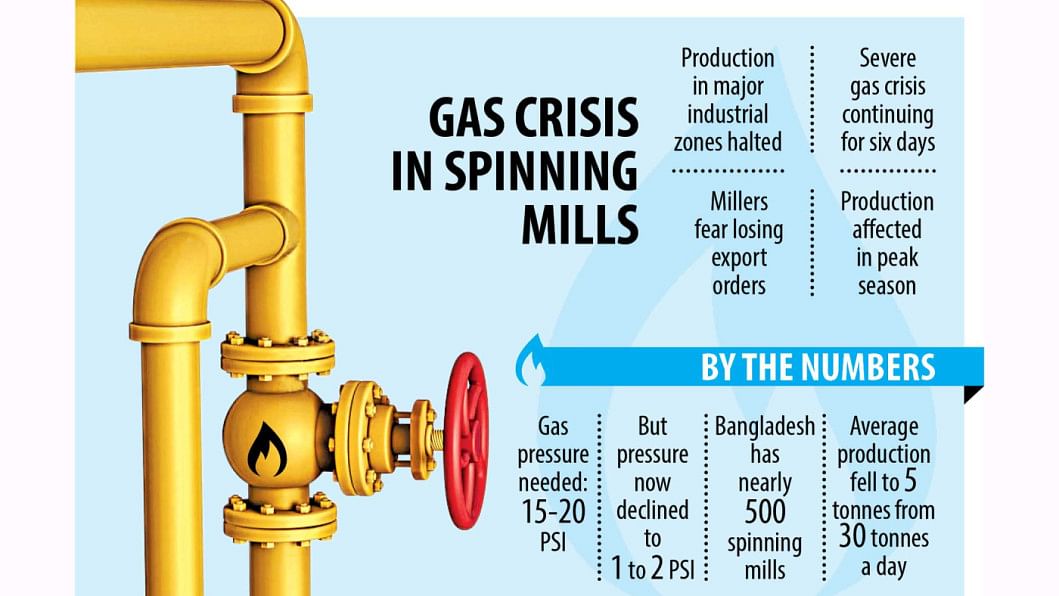Gas crisis plagues textile, spinning mills

Production in spinning mills in this peak season has remained halted over the past six days because of a severe crisis of gas for overhauling at the Bibiyana gas field.
Following the suspension in production, the millers are fearing that the export of garment items will be affected because of delayed supply of yarn to the export-oriented garment factories.
Usually, textile and spinning mills require supplies of a substantial amount of gas.
The suffering spinning and textile mills are in the major industrial zones like Gazipur, Savar, Ashulia, Shreepur, Dhaka, Narayanganj, Narsingdi and Bhaluka.
The gas pressure came down to 1 pound per square inch (PSI) to 2 PSI whereas the requirement was 15 PSI to 20 PSI, for which the production in the mills had remained almost suspended.
On an average day, Md Khorshed Alam, chairman of Ashulia-based Little Star Spinning Mills, can produce 12 tonnes of yarn.
But over the last five days he is producing 2.50 tonnes of yarn per day to serve weavers for the production of garment for the domestic markets.
Primarily, he has been incurring Tk 40.50 lakh in production losses every day, Alam told The Daily Star, adding that the gas crisis had been prevailing for quite some time but worsened over the last five days.
Similarly, Estahak Ahmed, managing director of Bhaluka-based Nortex Textile Mills and Basher Spinning Mills, said his production capacity declined to 8 tonnes to 9 tonnes instead from 50 tonnes per day because of the gas crisis.
He supplies yarn to export-oriented garment factories. "If we cannot supply raw materials timely to the garment factory owners, the factories will lose the buyers and work orders in the peak season," Ahmed pointed out.
Fazlul Haque, managing director of Shreepur-based Israq Spinning Mills, said his production declined to 25 tonnes over the last five days while on an average day he can produce 125 tonnes.
He also apprehends that his buyers might not accept goods if there is a delay as the work orders were placed for a season. If the season passes, the buyers will not want to take the goods, he said.
Monsoor Ahmed, chief executive officer of Bangladesh Textile Mills Association (BTMA), said every day members were complaining of losses and halts in production in the mills for the acute shortage of gas in the mills.
"We are getting ready to assess the losses in the factories over the last few days," he said.
He, however, said on an average, the factories which used to produce 30 tonnes of yarn daily had cut down to only five tonnes a day.
Mohammad Ali Khokon, president of the BTMA, said state-owned gas company Petrobangla had informed that the crisis had been prevailing since December last year but turned acute over the past one week.
"Almost all major textile mills have remained shut over the past five to six days because of the severity of the gas crisis. We want a quick solution as we have to supply raw materials to our buyers," he said.
Officials of Petrobangla could not be reached for comment despite repeated attempts yesterday.

 For all latest news, follow The Daily Star's Google News channel.
For all latest news, follow The Daily Star's Google News channel. 



Comments